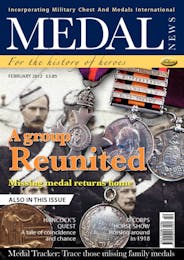Ignorance is bliss?
SITTING down one Sunday evening to watch BBC1’s new drama Sherlock (apologies to those outside the UK who may not know what I’m talking about—essentially it’s a modern day rewriting of the classic Sherlock Holmes and is really rather good), I was somewhat put out to find the great detective, usually so spot on with his observations, point to a photograph of a soldier and cite that he wore a “Distinguished Service Order” when the medal quite clearly was in fact a Conspicuous Gallantry Cross! The error was further compounded by Dr Watson stating that the picture had been taken during the “Falklands Era” when an Iraq medal was clearly visible and there was no South Atlantic Medal in sight . . . ! Now, other experts will point to the apparent anomaly of the RMP Major sporting a beard and other military errors and, quite rightly, state that the BBC obviously wasn’t going for accuracy, but for me the fact that Sherlock actually pointed out the medals and got it wrong, when he prides himself on being hyper-observant, rather spoilt things.
A similar thing happened with the National Theatre Company’s excellent production of War Horse, where the only medals I saw on stage—a QSA/KSA pair—were worn the wrong way round. I just couldn’t help noticing! Now the medals in the theatre weren’t a major issue—a slight error and only a geek like me would notice, but the Sherlock “incident” is different. There are people employed by production companies, be they the BBC or another, purely to get the small details right and if the script called for the two major characters to make note of a photo, then you would have thought those researchers could have paid a little more attention. With the new film of War Horse hitting the cinemas now, part of me is loathe to go and see it; not only was the stage show so brilliant (I really do urge you to see it) that I worry the movie just won’t measure up. But I also worry that I would sit there and start pointing out to those with me all the medallic inconsistencies I fear I will see! Of course, ideally I should be able to just set aside my knowledge, accept that what I am seeing is just fiction and enjoy it, but you and I both know such a thing is difficult. When we are possession of the knowledge of how something should be, it is difficult to ignore it when it isn’t. Of course, inconsistencies in films, television, etc., aren’t new—any movie website or book will be full of “howlers” and mistakes . . . wasn’t there a wristwatch in Ben Hur for example? That is probably just an urban myth, although there are certainly plenty of errors seen on screen all the time, but with medals it’s so easy to get it right that I can’t help but be infuriated every time I notice an MC ribbon worn on the end of a group or hear a Defence Medal described as a “George” Medal.
At this point many of you will be screaming “geek” and “anorak” at me, and maybe rightly so, but I bet you’re exactly the same—go on, admit it! The question is though, does it matter? Is it really that important for films and television to pay attention to such comparatively small details? I’m sorry to say that actually I think it does and it is, not in the wider realm of things of course. In the real world such details have no bearing on life, but films, television programmes, the theatre, et al, are there to entertain us and when something takes away from that entertainment, no matter how trivial, then it actually does become an issue. It is not a major problem I’ll admit, but like the fly in the ointment (or soup or whatever metaphor you care to use), it does tend to spoil things somewhat. Unfortunately there is little we viewers can do, not really—errors creep into productions all the time and let’s be honest most people don’t ever notice them. It is only because we are in the know that they stick out like the proverbial sore thumb. They say “ignorance is bliss” and I am afraid that sometimes that may well be true when itcomes to our “insider knowledge”. Of course, there is another way of looking at it—the original entertainment may well be spoiled the moment you notice a medallic error but you can then make your own entertainment by seeing how many other errors and inconsistencies you can spot. It can be great fun—that is as long as you don’t mind sleeping on the couch and having your wife and children not speak to you for days; sadly I fear that not everyone appreciates putting insider knowledge to such use . . . ! Happy viewing!

Archives
-
2024 (15 articles)
-
2023 (55 articles)
-
2022 (44 articles)
-
2021 (59 articles)
-
2020 (80 articles)
-
2019 (50 articles)
-
2018 (49 articles)
-
2017 (46 articles)
-
2016 (54 articles)
-
2015 (44 articles)
-
2014 (62 articles)
-
2013 (75 articles)
-
2012 (74 articles)
-
2011 (81 articles)
-
2010 (131 articles)
-
2009 (91 articles)
-
2008 (89 articles)
-
2007 (75 articles)
-
2006 (76 articles)
-
2005 (19 articles)
-
2004 (11 articles)
-
2003 (23 articles)
-
2002 (16 articles)
-
2001 (11 articles)









